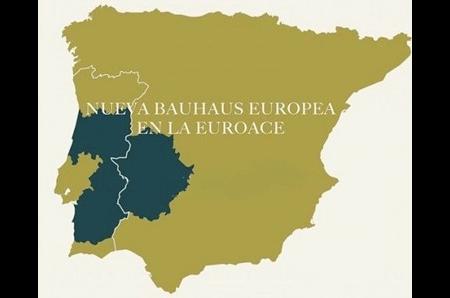What?
The SWINg Bauhaus, or the South-Western Iberian Territories Bauhaus, is an open and cross-border movement that aims to connect the Spanish and Portuguese communities of Extremadura and Alentejo, combine their skills and positively shape the region’s future. The project follows the principles of the New European Bauhaus, by aspiring to contribute aesthetic, sustainable and inclusive solutions to the European Green Deal. The goal of the initiative is to provide cultural and creative dimensions to the transition of various economic sectors into circular and sustainable production models through the direct contribution of local communities.
The cross-border aims at the root of the SWINg Bauhaus are to facilitate cooperation and knowledge transfer between the border regions in Portugal and Spain. The initiative is still in the early stages of its implementation, the first action realised was the establishment of a network of local stakeholders from different backgrounds, which will be used to raise awareness about the available opportunities and to discuss and develop different ideas.
The four key principles of the SWINg Bauhaus approach are as follows:
- Bottom-up: Ideas should come from the territory, through the proposals made by organisations, and spread into the rest of society and its administrations. Administrations are crucial to this process as they enable these proposals to be implemented, promoting the generation of value in the territory.
- Collaborative and open: All the society, collectives, individuals, organisations and institutions can join the movement to design a new future for Spain, Portugal and Europe.
- Cross-border: The Spanish region of Extremadura and the eastern part of the Portuguese region of Alentejo are conceived of as one territory. The diversity, cultural richness and entrepreneurial potential of this region is incalculable and a common vison for the future is the best way to realise its potential.
- Interdisciplinarity: The movement involves combining art with medicine, architecture with design, research with sustainability and agriculture. Mixing these elements is a foundational part of the New European Bauhaus approach and results in legitimately inclusive projects.
Who?
The initiative was initiated in Extremadura by four local organisations (Emprendedorex, MB3-Gestión, Singular and Teamlabs). Deciding to partake in the New European Bauhaus they formed a team in order to generate value in their territory by following the principles of the movement. Currently, the four organisations also collaborate with local administrations and private organisations from both countries to achieve their objectives.
Where?
The initiative was born in Extremadura, an inner Spanish region bordering with Portugal. It is included in the wider framework of the New European Bauhaus in the Euroregion EUROACE Alentejo (PT), Centro (PT) and Extremadura (ES). In this regard, EUROACE administration has been particularly helpful in providing contacts and establishing links between the two border regions, facilitating cooperation.

How?
The movement has not received any type of EU funds, the activities carried out so far have been funded by local governments and local institutions. However, it applied for the support of the deployment of lighthouse demonstrators for the New European Bauhaus initiative in January.
Results
The movement has created a community that nurtures innovation by encouraging interested parties to share proposals on how to reform Extremadura in aesthetic, sustainable and inclusive ways. This community is accessible through both a fast-growing Telegram channel which as of March 2022 counts around 130 participants from local organisations and associations and a newsletter. These channels enhance the SWINg Bauhaus’s aim to foster the conception of future projects in line with the movement’s values.
HackExtrem, hosted by the Fundación Extremeña de la Cultura which is a public institution supporting cultural initiatives in the area, is the first project fostered by SWINg Bauhaus. The project is designed to facilitate the involvement of various, diverse actors in the valorisation of the territory: it is a call to rethink, from novel and unconventional perspectives, the challenges faced by this border territory. #Hack0, the project’s first event, took place in May 2021. The event saw thirty people from a range of sectors, covering both the arts and sciences, convened for six weeks to brainstorm innovation solutions to the region’s challenges and ultimately to develop project proposals. At the end of the six weeks the groups presented the following proposals:
- An eco-incubator to optimise agri-businesses water cycles;
- An innovative Lab to create a network to identify and solve territorial issues through cultural initiatives;
- an App called “Rural Power” to valorise the rural territory and connect children to urban centres;
- the creation of a “village experience” to attract new residents.
These ambitious proposals have not been financed yet, but they are exploring various ways to secure funds. The next event will be held in April in Portugal.
More information:
- Log in om opmerkingen te posten

